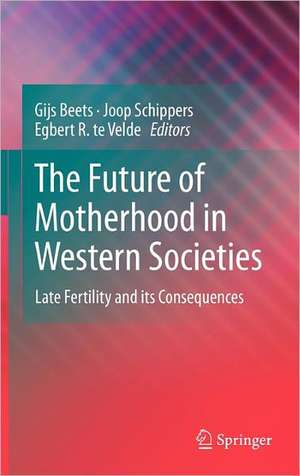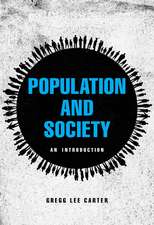The Future of Motherhood in Western Societies: Late Fertility and its Consequences
Editat de Gijs Beets, Joop Schippers, Egbert R. te Veldeen Limba Engleză Hardback – 15 dec 2010
| Toate formatele și edițiile | Preț | Express |
|---|---|---|
| Paperback (1) | 637.46 lei 6-8 săpt. | |
| SPRINGER NETHERLANDS – 28 sep 2014 | 637.46 lei 6-8 săpt. | |
| Hardback (1) | 643.65 lei 6-8 săpt. | |
| SPRINGER NETHERLANDS – 15 dec 2010 | 643.65 lei 6-8 săpt. |
Preț: 643.65 lei
Preț vechi: 757.24 lei
-15% Nou
Puncte Express: 965
Preț estimativ în valută:
123.17€ • 127.76$ • 102.70£
123.17€ • 127.76$ • 102.70£
Carte tipărită la comandă
Livrare economică 27 martie-10 aprilie
Preluare comenzi: 021 569.72.76
Specificații
ISBN-13: 9789048189687
ISBN-10: 9048189683
Pagini: 222
Ilustrații: XII, 222 p.
Dimensiuni: 155 x 235 x 14 mm
Greutate: 0.51 kg
Ediția:2011
Editura: SPRINGER NETHERLANDS
Colecția Springer
Locul publicării:Dordrecht, Netherlands
ISBN-10: 9048189683
Pagini: 222
Ilustrații: XII, 222 p.
Dimensiuni: 155 x 235 x 14 mm
Greutate: 0.51 kg
Ediția:2011
Editura: SPRINGER NETHERLANDS
Colecția Springer
Locul publicării:Dordrecht, Netherlands
Public țintă
ResearchCuprins
Preface.- Introduction.- Chapter 1: Is women's emancipation still compatible with motherhood on Western societies? Egbgert R. te Velde.- Chapter 2: Males and females: the big little difference: Jan A.R.A.M. van Hooff.- Chapter 3: Sexual differentiation of the human brain and male/female behaviour: Dick F. Swaab.- Chapter 4: On the societal impact of mdern contraception: Dirk J. van de Kaa.- Chapter 5: The demography of the age at first birth: the close relationship between having children and postponement: Gijs Beets.- Chapter 6: The economic rationality of late parenthood: Joop Schippers.- Chapter 7: The complexity of parenthood in modern societies: Anneke van Doorne-Huiskes & Ingrid Doorten.- Chapter 8: The importance of children and families in welfare states: G¢sta Esping-Andersen.- Chapter 9: The post-career mom: reproductive technology and the promise of reproductive choice: Elisabeth Beck-Gernsheim.- Chapter 10: On delayed fatherhood: the social and subjective 'logics' at work in men's lives (a UK study): Karen Henwood.- Fiona Shirani & Joanne Kellett.- Chapter 11: Women's lifestyle preferences in the 21st century: Catherine Hakim.- Chapter 12: The future of motherhood: conclusions and discussion.- Annex. List of authors.
Textul de pe ultima copertă
iMost couples wish to have children, but when is the best time to have the first child and when is postponement justified? The answers vary from couple to couple and involve many factors including conflicting goals of the parents, housing, career paths, income, parental leave policies and child care arrangements. Nonetheless, the biological clock never stops ticking, and assisted reproductive technology cannot guarantee a successful outcome.
This book offers a holistic overview of the process of postponement and its background in modern Western societies both at the personal and societal levels. It includes contributions from reproductive, evolutionary biological and neurological sciences as well as from the fields of demography, economics, sociology and psychology. It argues that governments could support couples by a cafeteria-like set of arrangements from which one can compose a package according to personal preferences that can facilitate to a break in the rising age of first motherhood.
This book offers a holistic overview of the process of postponement and its background in modern Western societies both at the personal and societal levels. It includes contributions from reproductive, evolutionary biological and neurological sciences as well as from the fields of demography, economics, sociology and psychology. It argues that governments could support couples by a cafeteria-like set of arrangements from which one can compose a package according to personal preferences that can facilitate to a break in the rising age of first motherhood.
Caracteristici
Contains an international team of experts trying to solve the old dilemma of how to make work and family life compatible Offers a new interdisciplinary look at shaping work and family life more smoothly Discusses how to balance careers and family in aging societies Addresses what is the best age to have the first child











